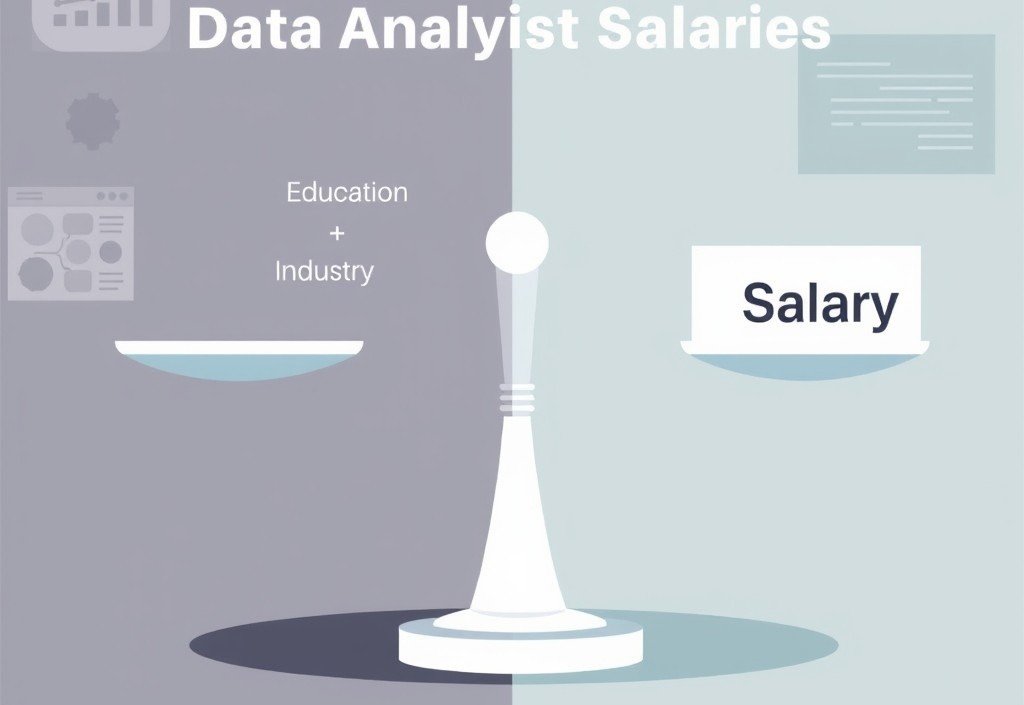Data Analyst Entry Level: What You Can Expect in 2025
Introduction
Aspiring data analysts stepping into the workforce in 2025 will find a landscape defined by robust demand, attractive salaries and well charted career paths. Across industries and regions entry level pay the growing importance of turning raw information into strategic advantage.
By familiarizing yourself with current salary benchmarks and the key factors that drive compensation such as technical expertise, industry sector and geographic location you can confidently evaluate job offers. Cultivating in demand skills like SQL, Python and data visualization tools will not only boost your starting salary but also open doors to specialized roles.
Building a compelling portfolio of real world projects and earning industry recognized certifications can further distinguish you in a competitive market. Networking through professional communities and refining your interview storytelling will help you negotiate the best possible package. Ultimately combining continuous learning with practical experience positions you for rapid growth and long term success in the dynamic field of data analytics.
Understanding the Role of a Data Analyst

Entry level Data Analysts are essential in converting raw data into actionable insights that support business decisions. Their main responsibilities include collecting and cleaning data to ensure accuracy and consistency.
They perform statistical analysis and data modeling to uncover trends and patterns within datasets. Creating clear and impactful visualizations such as dashboards and reports is crucial for communicating findings to stakeholders. They also interpret data results and provide recommendations to help organizations improve strategies and processes.
This role provides a strong foundation for advancing into specialized data positions like Data Scientist or Analytics Manager. Employers value candidates with problem solving skills attention to detail and the ability to translate complex data into understandable business insights.
- Data collection and preprocessing to ensure high quality inputs
- Statistical analysis and data modeling to identify trends and relationships
- Creating dashboards and visualizations that communicate findings effectively
- Reporting results to stakeholders and recommending data-driven strategies
This role serves as a foundation for advanced paths such as Data Scientist, Business Intelligence Analyst or Analytics Manager. Employers look for candidates with strong problem solving skills, attention to detail and the ability to translate complex analyses into clear business narratives.
Average Data Analyst Salary Entry Level

United States
As of 2025 the average annual salary for entry level Data Analysts in the United States typically ranges between $55,000 and $75,000. This range reflects differences influenced by multiple factors such as geographic location, industry sector and the size of the employer. For example: data analysts working in tech hubs like San Francisco or New York City may earn towards the higher end of this scale due to local demand and higher living costs.
Additionally, industries like finance, healthcare and information technology tend to offer more competitive salaries compared to others. Employer size also plays a role with larger companies often providing higher compensation packages. Overall entry level data analyst salaries fluctuate based on these variables but $55,000 to $75,000 is a reasonable estimate for 2025 in the US. This aligns with reported averages from multiple salary platforms reflecting a healthy and growing demand for data analytics skills
| Region | Annual Salary Range | Source |
|---|---|---|
| San Francisco, CA | $72,000 – $85,000 | ZipRecruiter, Entry Level Data Analyst Salary San Francisco, CA https://www.ziprecruiter.com/Salaries/Entry-Level-Data-Analyst-Salary-in-San-Francisco,CA |
| New York City, NY | $68,000 – $80,000 | ZipRecruiter, Entry Level Data Analyst Salary New York City, NY https://www.ziprecruiter.com/Salaries/Entry-Level-Data-Analyst-Salary-in-New-York-City,NY |
| Austin, TX | $60,000 – $70,000 | ZipRecruiter, Entry Level Data Analyst Salary in Austin, TX https://www.ziprecruiter.com/Salaries/Entry-Level-Data-Analyst-Salary-in-Austin,TX |
| Atlanta, GA | $58,000 – $68,000 | Glassdoor, Entry Level Data Analyst United States https://www.glassdoor.co.in/Salaries/us-entry-level-data-analyst-salary-SRCH_IL.0,2_IN1_KO3,27.htm |
| Remote Roles (U.S.) | $55,000 – $70,000 | CareerFoundry, Entry Level Data Analyst Salary (Average)$65,491 https://careerfoundry.com/en/blog/data-analytics/entry-level-data-analyst-salary/ |
Explore in depth salary data for U.S entry level roles on CareerFoundry’s guide:
What’s a Realistic Entry-Level Data Analyst Salary?
Remote Roles

Fully remote entry level positions offer flexibility without sacrificing pay:
- Range: $45,000 – $65,000
- Mid-2025 average: $75,000 across all Data Analyst levels with entry-level roles clustering around $55,000.
Global Comparison
| Country | Entry-Level Range (Local) | Entry-Level Range (USD) |
|---|---|---|
| United Kingdom https://www.itjobswatch.co.uk/jobs/uk/junior%20data%20analyst.do | £28,000 – £35,000 | $35,000 – $43,000 |
| Canada https://www.glassdoor.ca/Salaries/entry-level-data-analyst-salary-SRCH_KO0,24.htm | CA$50,000 – CA$65,000 | $37,000 – $48,000 |
| India https://www.glassdoor.co.in/Salaries/entry-level-data-analyst-salary-SRCH_KO0,24.htm | ₹4.0L – ₹6.5L per annum | $4,900 – $8,000 |
| Australia https://au.indeed.com/career/entry-level-data-analyst/salaries | AU$60,000 – AU$75,000 | $40,000 – $50,000 |
DataCamp’s worldwide salary survey and regional sites such as The Vista Academy and Himalayas.
Source:
https://www.datacamp.com/blog/data-analyst-salaries-worldwide
https://himalayas.app/salaries/countries/india/entry-level-data-analyst
Factors Influencing Entry-Level Data Analyst Salary

1. Education and Certification
A degree in data science, statistics or computer science can significantly boost your starting salary as a data analyst. Having relevant educational qualifications demonstrates your foundational knowledge and analytical skills which employers highly value.
Additionally certifications such as Google Data Analytics, Tableau or Microsoft Power BI add substantial value by validating your proficiency with essential tools and techniques. These credentials help differentiate you in a competitive job market and may lead to higher initial pay. Combining formal education with recognized certifications positions you well for better opportunities and salary growth in the data analytics field.
2. Skills and Tools
Proficiency in key technical skills like SQL, Python, R and Excel is essential for data analysts. Familiarity with visualization tools such as Tableau and Power BI enhances your appeal to employers. Companies highly value candidates who can work confidently with these tools.
Experience with cloud platforms like AWS or Azure further increases your earning potential. Knowledge of modern data stacks, including Snowflake and dbt is particularly desirable. These advanced skills not only boost marketability but also help command higher salaries.
3. Industry of Employment
The industry you choose as a data analyst can have a major impact on your starting salary. Sectors like technology, finance and healthcare are known to offer higher than average compensation for entry level roles. In particular technology focused companies especially those in leading tech hubs typically provide more competitive pay.

https://www.projectpro.io/article/how-to-become-a-healthcare-data-analyst/707
Within the finance sector fintech startups in major cities such as New York often offer entry level packages approaching $78,000 while traditional firms usually start closer to $68,000. Healthcare organizations are also increasing pay for skilled analysts as data driven strategies become essential across the industry. Working in these fast paced environments not only boosts your earning potential but can also accelerate career growth. Ultimately the specific industry and employer type you choose will greatly influence your salary trajectory as a new data analyst
https://www.ccslearningacademy.com/healthcare-data-analyst-salary
https://eicta.iitk.ac.in/knowledge-hub/data-analytics/data-analyst-salary/
4. Internship or Project Experience
Gaining practical experience through internships, Kaggle competitions or capstone projects can significantly enhance your value as an entry level data analyst. Employers often view hands on work as proof of your job readiness and technical ability. By showcasing impactful projects in your portfolio you can demonstrate your capability to tackle real world problems and deliver results.

Active participation in Kaggle competitions or industry focused projects helps sharpen essential skills often making you stand out in a crowded job market. Candidates with such practical experience frequently command 10 to 15% higher base salary offers compared to those without it. These experiences not only validate your skills but also increase your confidence during interviews and on the job. Ultimately demonstrating the real world impact of your work signals that you are prepared for the demands of a data analytics career.
https://proschoolonline.com/blog/must-say-yes-capstone-projects
5. Location and Company Size
The location of your job and the size of the company both play a significant role in shaping your starting salary as a data analyst. Large enterprises in metropolitan areas often offer higher compensation to reflect the increased cost of living and greater corporate budgets. These organizations can provide additional benefits and resources that may not be available at smaller firms.
By contrast positions in smaller companies or regions with a lower cost of living typically come with reduced salaries often 10 to 20% below the national average. However such roles may offer other advantages such as closer collaboration within smaller teams or greater flexibility. It’s important to weigh both salary and non monetary benefits when evaluating offers. Ultimately where you work and for whom can greatly influence your earning potential and career growth as you start in data analytics.
Skills That Boost Entry Level Salaries

Master both technical and soft competencies to command top-tier offers:
- SQL for database querying
- Python/R for statistical analysis
- Tableau/Power BI for compelling visualizations
- Excel for rapid, ad-hoc analyses
- Business Communication for translating insights
- Critical Thinking to frame impactful questions
Real World Examples:
A recent entry level hire at a mid sized fintech startup in NYC with SQL, Python and a published Tableau portfolio secured a $78,000 offer—$10,000 above peers lacking a showcase of real analyses.
Remote first startups such as those featured on LinkedIn’s salary insights offer competitive ranges:
Remote Data Analyst Salary National Overview
Career Growth Opportunities
Entry level Data Analysts typically progress as follows:
| Role | Years Experience | Salary Range |
|---|---|---|
| Senior Data Analyst | 2–4 years | $85,000 – $110,000 |
| Data Scientist | 3–5 years | $100,000 – $130,000 |
| Business Intelligence Analyst | 3–5 years | $90,000 – $115,000 |
| Analytics Manager | 5+ years | $110,000 – $150,000 |
Within 2 to 3 years analysts who upskill in machine learning, lead projects or transition to data science often double their starting salaries.
How to Increase Your Entry Level Salary

Upskill Continuously
Continuously upskill by engaging in micro credentials, bootcamps and specialized courses to stay competitive in data analytics. Platforms like Coursera offer guides and Professional Certificates specifically designed to help boost a data analyst’s salary by teaching in demand industry skills. Bootcamps and micro credential programs focus on hands on job ready expertise through practical projects and assessments.
https://www.datacamp.com/blog/best-data-analytics-bootcamps
https://catalog.purdueglobal.edu/bulletin/introduction-data-analytics
Regularly acquiring new certifications not only updates your knowledge but also makes you more attractive to employers. This ongoing learning approach is key for career and salary growth in the fast evolving data analytics field
https://www.coursera.org/in/articles/how-much-do-data-analysts-make-salary-guide
Build a Portfolio

Build a strong portfolio by publishing GitHub repositories that showcase your end to end data analyses. Include interactive dashboards to highlight your technical and visualization skills. Document your case studies thoroughly to demonstrate your problem solving approach. A well organized portfolio helps employers clearly see your expertise and project experience.
Network Strategically
Network strategically by building genuine connections through platforms like LinkedIn which can reveal job openings not posted publicly. Attend industry meetups to interact with professionals and insiders who may offer referrals or valuable job leads. Engaging in open source projects allows you to showcase your skills and connect with collaborators who may recommend you for roles.
https://www.digitalwaffle.co/blog/importance-of-networking-in-your-job-search
https://dev.to/github20k/contributing-to-open-source-will-10x-your-chances-to-land-a-new-job-433f
Many employers value direct recommendations and robust networking can substantially increase your access to hidden opportunities. By leveraging all these avenues you position yourself for referrals and unadvertised positions in your industry
https://www.indeed.com/career-advice/finding-a-job/how-to-network-for-a-job
Prepare for Interviews

Prepare thoroughly for interviews by practicing how you explain your projects, coding approaches and the business value you’ve delivered. Focus on strong storytelling to clearly communicate your skills and impact.
Effective articulation of your problem solving process can set you apart from other candidates. Interviewers are often impressed when you can translate technical achievements into real world results. Mastering these communication skills may help you secure offers that are 5 to 10% higher.
Conclusion
The Data Analyst Entry Level in 2025 reflects the rising importance of data-driven decision-making in every industry. While salaries vary depending on location, skills, and experience, the overall trend is upward. With the right blend of education, tools, and real-world experience, aspiring data analysts can not only enter the job market with competitive pay but also carve out a successful long-term career path in analytics.
FAQ’s
1. What does a data analyst do?
A data analyst collects, processes, and analyzes data to help businesses make informed decisions. They use tools like Excel, SQL, and Python to interpret trends and patterns.
2. What qualifications do I need to be a data analyst?
Typically, a bachelor’s degree in statistics, computer science, or a related field is required. Skills in data tools and programming languages like SQL, Python, and Excel are essential.
3. Is data analyst pay good?
Yes, data analyst salaries are generally competitive, especially in tech, finance, and healthcare. Entry-level roles often start around $60K–$80K annually, with potential for growth.
4. Can I make 200K as a data analyst?
Yes, it’s possible at senior levels or in high-paying industries like tech or consulting. It often requires experience, specialization, and sometimes transitioning into data science or analytics leadership.
5. Is data analyst a lot of math?
Data analysis involves some math, mainly statistics and probability. However, it focuses more on interpreting data patterns than doing complex equations daily.


